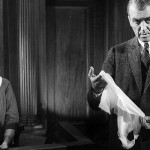A.I. Artificial Intelligence Review
Posted on May 12, 2010 By John Gilpatrick 2000s, Movie Reviews
The origins of A.I. are well-known. The story was the brainchild of Stanley Kubrick, but he refused to make it into a film until technology was advanced enough to do it justice. He died before ever getting the chance to make the film. Enter Steven Spielberg, who was entranced by Kubrick’s story. He decided to make it with the late director’s original vision in mind. What results is a strange, but fascinating amalgam of two great minds. On the one hand, we have the bleak, somewhat cruel look at human nature from Kubrick. On the other, we get the optimism, the “everything’s gonna be alright†feeling from Spielberg.
For two hours, the film moves along swimmingly, with a minor hiccup here or there, but on the whole, very successful. Then, we get heartbreaking scene that I couldn’t help but feel would’ve been a perfect, and very Kubrick-ian, ending. The disappointingly contrived 20-minute prologue that makes everything happy again, despite what many think, was part of Kubrick’s original story, but it feels like Spielberg’s worst impulse come to life. Whatever. It’s a bummer made the final cut. These closing scenes almost disrupt the terrific two hours preceding them, but I don’t want to take too much away from the film as a whole just because the ending left a sour (or should I say far too sweet) taste in my mouth.
The film opens with a Professor Hobby (William Hurt) describing the landscape and technology of the world an unknown number of years in the future. Global warming has resulted in water levels so high they have swallowed up New York and other coastal cities. Resources are scarce, so pregnancies are outlawed unless you are lucky enough to obtain a permit. And much of the world is reliant on robots, who are look like humans and in many ways think like them, but cannot feel like them. Hobby’s goal, however, is to advance robot technology to the point that robot children are capable of loving a human parent and vice versa.
Twenty years later, it appears Hobby has done it. David (Haley Joel Osment) is sent to live with Monica (Frances O’Connor) and Henry (Sam Robards), whose son, it appears, is terminally ill. Monica is very resistant at first, but eventually she comes around to David and actually starts to love him, while David is absolutely attached to her. Eventually, Monica and Henry’s son, Martin (Jake Thomas), returns home healthy. The two start a rivalry, and when David accidently jeopardizes Martin’s life once more, Monica makes the difficult decision to abandon him in the woods. Thus begins David’s journey to become a real boy. Aided by his loyal companion Teddy (voice of Jack Angel), David navigates the dangerous world, gets captured by some anti-robot maniacs, meets a helpful pimp (Jude Law), goes to a futuristic Las Vegas, and finally journeys to an underwater New York, where he is met with some surprising information.
A.I. is separated into three distinct sections. The first is David’s interaction and eventual abandonment by his family, especially his mother. These scenes feel slightly awkward at first, but by the end of the film, it was clear how important they were in establishing the characters and the strength of their love for each other. The second is easily the most exciting. It plays a lot like a road trip, but much more existential and meaningful. And once David makes it to New York, there are quite a few surprises and interesting questions raised. For example, what is it that classifies someone as human?
The third section is the most problematic. We are taken 2000 years into the future and get to see just how much has changed. But we are also forced to sit through a contrived conclusion to what was an effecting tragedy. The first two hours of A.I. can best be described as dogged hopelessness, but the final twenty minutes negate the impact of this tragedy.
Haley Joel Osment gives a terrific performance as David. We are always aware that he is a robot, but he never makes it blatant. We see David change quite a bit over the course of the film, and Osment sells it well. Frances O’Connor is good as Monica. We see just how conflicted she is about leaving David, and it gives the film a stronger emotional punch. The only other actor with a lot of screen time is Jude Law, who is charismatic and not much else, but I have to point out the awesomeness that is Teddy. Possibly my favorite part of the film was this amazing toy – an intelligent robot teddy bear who talks to David and accompanies him everywhere he goes, even saving him from a jam at one point. I want a Teddy. So if any of you faithful readers want to get me a present (and my birthday is next week, hint, hint), I certainly wouldn’t complain if I got a Teddy in the mail.
Overall, I was very pleased with A.I. The film was a bust when it was released in 2001, but I’d say it’s a decidedly un-commercial project, despite Spielberg’s best efforts. It has its flaws, but the strength of the ideas and questions to ponder, as well as the strong acting, beautiful cinematography, and excellent visual effects, makes it very worthy viewing.
2001, 3.5 Stars, A.I. Artificial Intelligence, Brendan Gleeson, Frances O'Connor, Haley Joel Osment, Ian Watson, Janusz Kaminski, John Williams, Jude Law, Michael Kahn, Nancy Haigh, Rick Carter, Sam Robards, Stanley Kubrick, Steven Spielberg, William Hurt
















